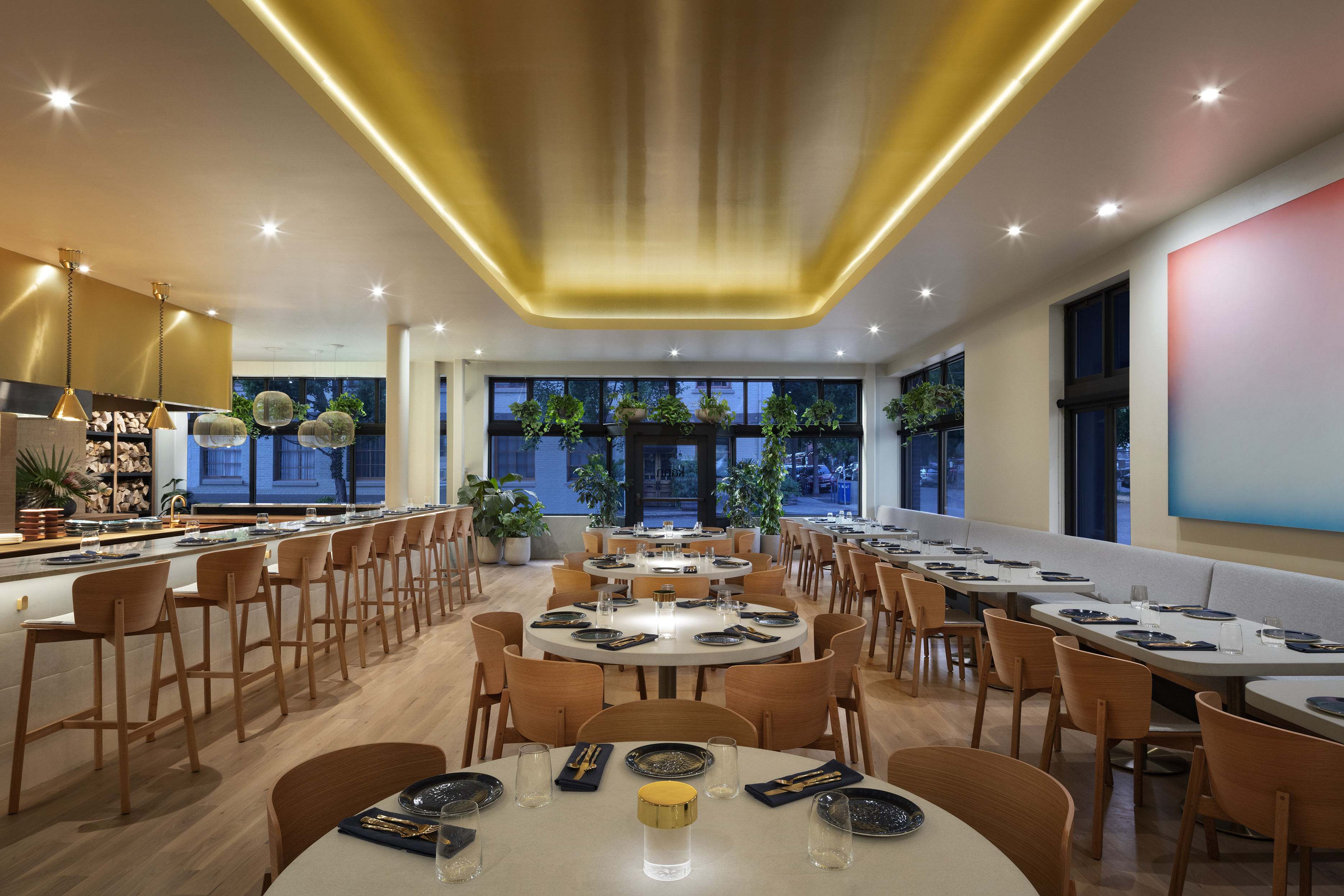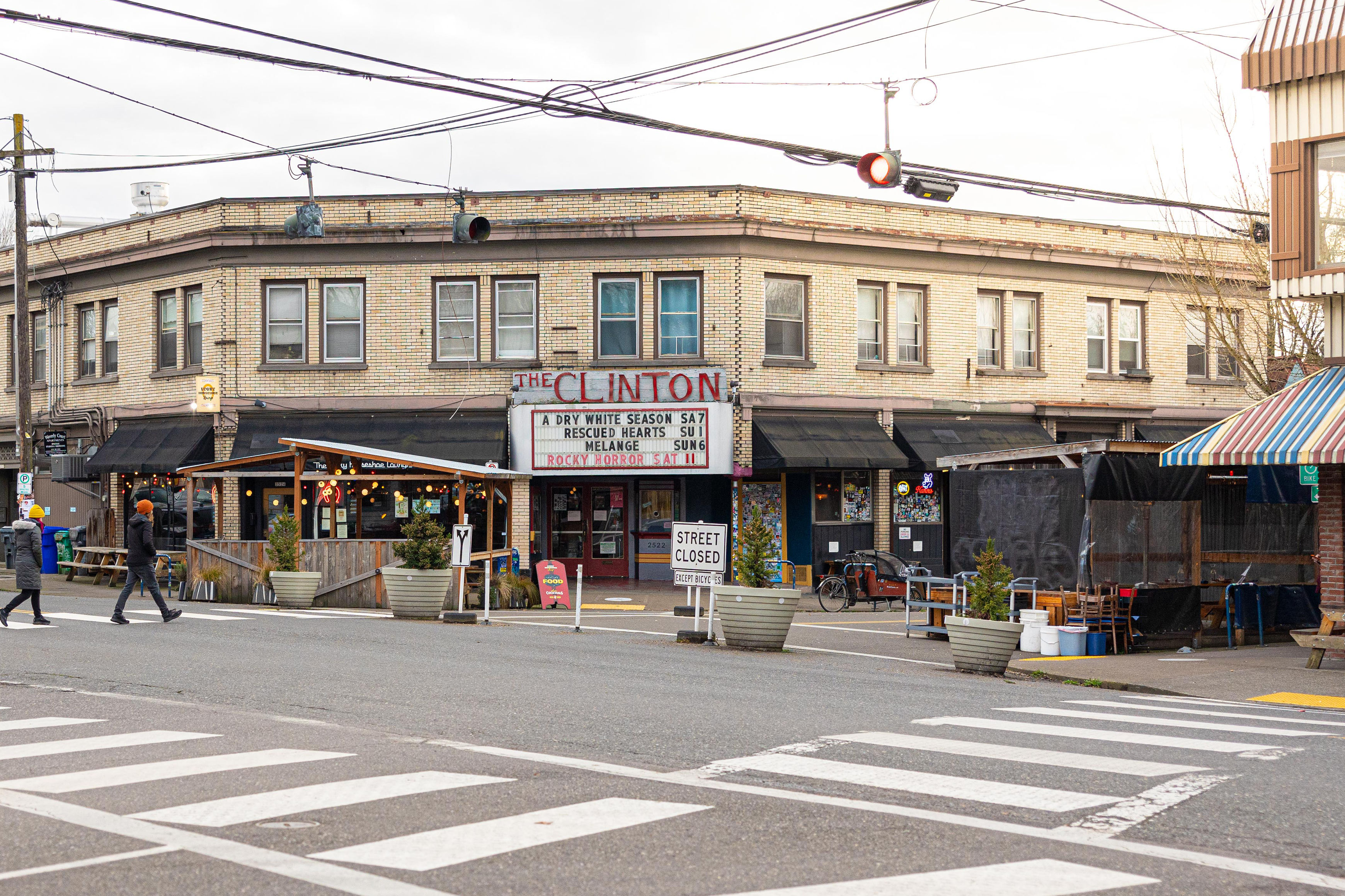Born-and-Raised Portlander Gabriel Pascuzzi Talks ‘Top Chef’
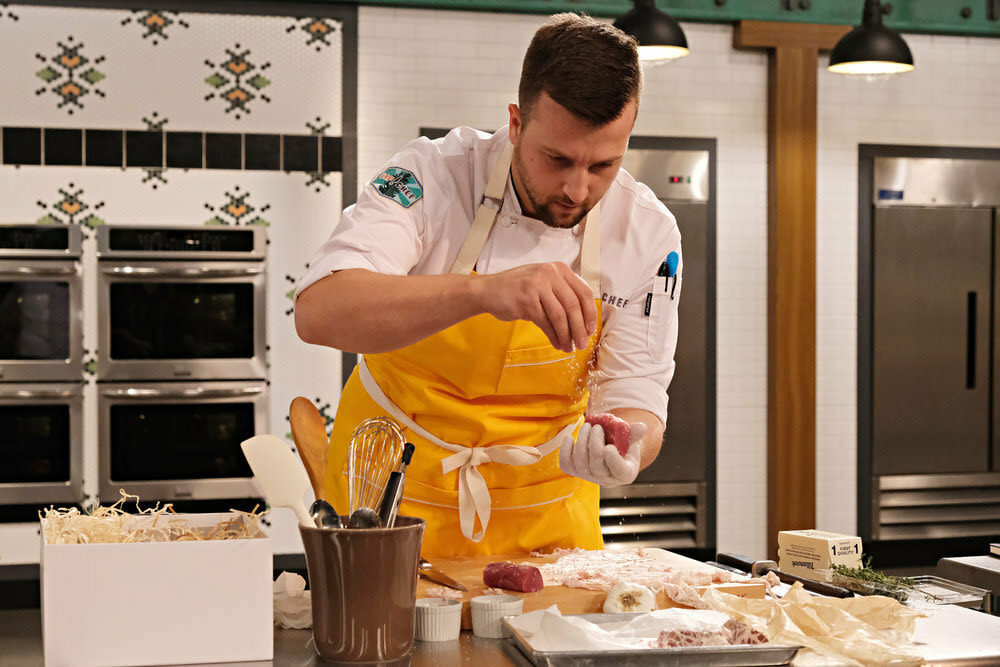
Gabriel rises to the challenge in Episode 1.
Image: Courtesy David Moir/Bravo
This season of Top Chef featured two Portland chefs: Sara Hauman, who's currently the executive chef at Soter Vineyards in Carlton, and Gabriel Pascuzzi, a born-and-raised Portlander who currently owns wood-fired chicken and veggies restaurant Mama Bird and Stacked Sandwich Shop. (We at PoMo are big fans of the oxtail French dip sandwich, which earned the eatery a PoMo Best Restaurants award in 2017.) His new, long-anticipated grain bowl restaurant, Feel Good, is expected to open this month. Even when he’s not busy slaying quickfire challenges using local mushrooms like he did in Episode 6, he’s always proudly repping Portland. He recently took fellow cheftestant Jamie Tran around town to eat wings at Prey & Tell, go hiking and morel hunting, and check out the local farmers markets. Pascuzzi, along with Nelson German, was sent packing at the end of Episode 6 for their antelope-steelhead dish. We talked with him about his experience on the show, his favorite places to eat in Portland, and how the city shaped his love for food.
What made you decide to go on Top Chef?
I started watching it when it came out, I think during my sophomore year of culinary school, with my friends. I think I've watched pretty much every season. When I worked for Tom [Colicchio, one of the show’s judges], the first thing they’d tell you when I started working there in like 2011 was, “Hey, by working here, you'll never be able to go on Top Chef,’ and I’m like ‘OK, cool, whatever. I just want to work at a nice restaurant.’ But they started inviting old cheftestants back, and it kind of changed their rules. I played sports my whole life, I like competition, and it seemed like fun. And in retrospect, it’s maybe not as fun as it looks all the time, but it was a great experience and it's a great platform, so why not?
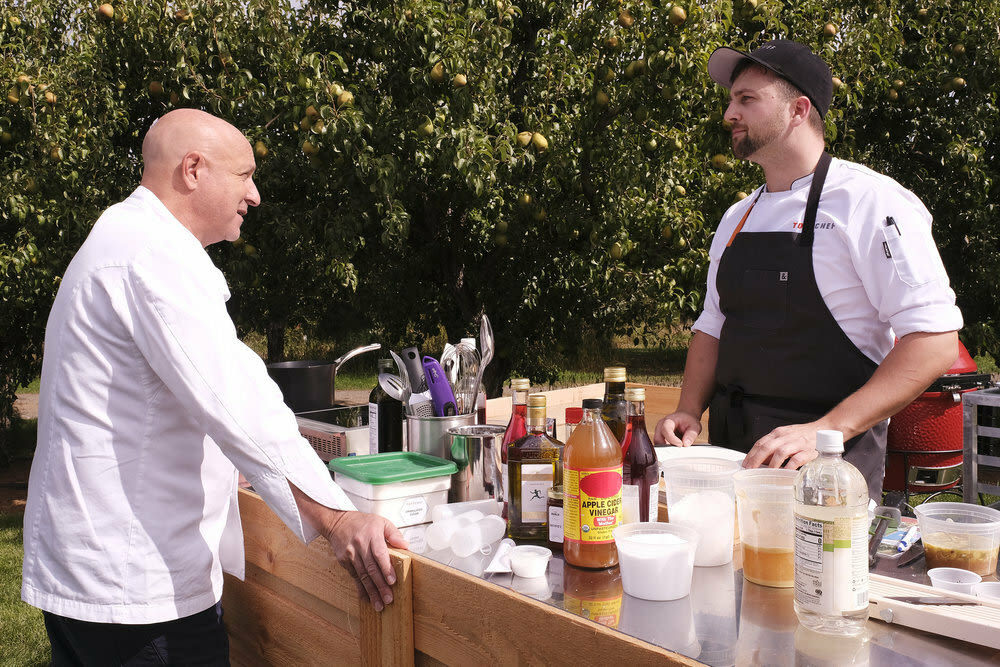
Gabriel chats with his former boss in Episode 4.
Image: Courtesy David Moir/Bravo
Having worked for Tom Colicchio, were you nervous at all about cooking for him, or did that make you feel more at ease since you knew what his style was like?
They asked me so many times on the show, too. I was like, ‘You know what, I'm not just cooking for him. I’m also cooking for the other judges.’ Ultimately, it's kind of how I run my restaurants—I cook things I want to eat. I'm not gonna try to cook something I think people want to eat, if that makes sense. I think some chefs get caught trying to cook what they think people want to eat, and I think that's when you get in trouble.
How did growing up in Portland influence your decision to pursue a career in food?
I grew up in Southwest Portland, basically between Hillsdale and Multnomah Village. My grandfather's off-the-boat Italian, and he came directly here. My great-uncle lived right next door to us, and my dad and all my uncles had gardens, and they would exchange notes with each other and trade seeds and trade starts, which was super fun to grow up in a yard that had all these fruits and vegetables that my grandfather had planted. My grandfather and grandmother passed away before I was born, so I got to experience [my grandfather’s] legacy. also going out foraging, as a kid, and crabbing on the coast, and razor clam digging—a lot of things that are ingrained in Italian culture, being really involved in your local ecosystem and finding what it provides. Oregon has an amazing ecosystem that you can find mushrooms in the forest, go to the coast, pick berries. The gardens that my dad and uncles grew. How in touch I was with food growing up definitely influenced me becoming a chef.
What are your favorite restaurants in Portland to eat at when you're off-duty?
That's kind of hard to answer right now, because some are finally starting to open again and some will never open again. I always love to go to Farmhouse Thai. I just tried Diane Lam’s Prey & Tell, and it was super tasty. I went to Kann a couple weeks ago—it was my first date with my girlfriend since COVID hit, so it was really nice to be able to go and do that, a really special experience. Back when I was eating out a lot, Urdaneta.
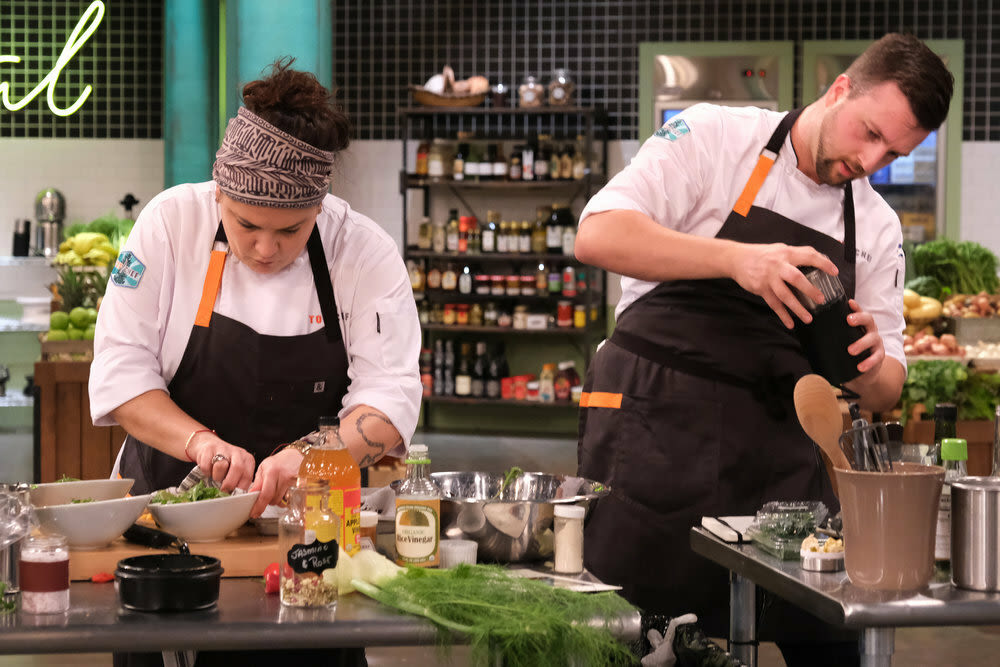
Gabriel and Maria frequently butted heads on the show.
Image: Courtesy David Moir/Bravo
What was it like watching yourself on the show? Are you happy with the way you’re portrayed?
It's weird. It's super weird. I mean, it's kind of interesting how they cut things, knowing all that happened in the later episodes. I mean, I'm getting a little bit of a villain cut, I feel like. But you know, it is what it is.
It’s honestly more fun watching the other chefs, ’cause you don’t have a lot of time to really watch them cook. Quickfires, you can kind of go around and taste other people’s stuff, but in elimination challenges you rarely see other people’s dishes.
For Portlanders who are looking to get a sense of your cooking style, what dishes would you recommend they try at your restaurants?
I mean, Mama Bird is so simple, right—it's chicken and vegetables off a wood-fired grill. Obviously I think you can see through the two concepts, I kinda lean towards trying to eat healthier food, but healthy food that has a lot of flavor. And then Stacked is kind of like a guilty pleasure—eat a carb-and-meat bomb. But we try to be playful with our vegetarian and vegan sandwiches there, too. I try to really focus on what the ingredients are. At Mama Bird, it's about highlighting the chicken and highlighting the vegetables on that grill. At Stacked, it's very much about making sure that sandwich is balanced, and it's not too rich, not too fatty; you get some acid or crunch or some freshness.
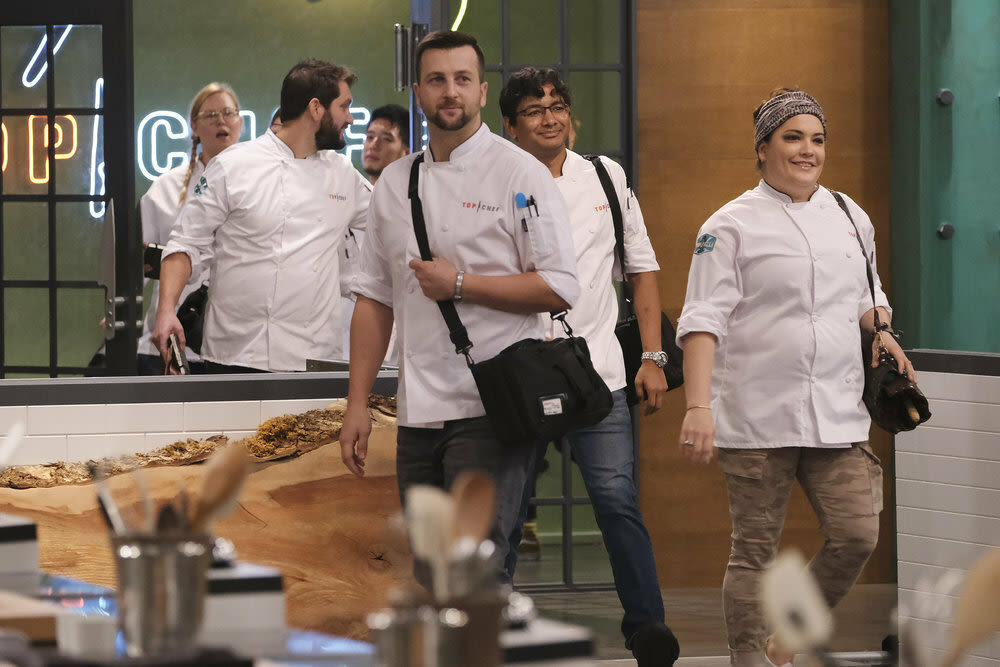
The chefs get ready for another cooking challenge.
Image: Courtesy David Moir/Bravo
Having done more fine dining dishes on Top Chef, do you find you’re missing doing that type of food?
To me, fine dining is very ego-driven. And I purposely didn't open fine dining restaurants because one, it's extremely hard to staff, and two, you're charging such high prices that the pressure to deliver to guests is a lot higher. I've worked for plenty of places where they scream at you and use all sorts of descriptive language at you, and I just never wanted to be that way as a chef. I very much try to coach, and grow, and have conversations with people and try to explain to them what went wrong, or help them learn the lesson from what happened.

